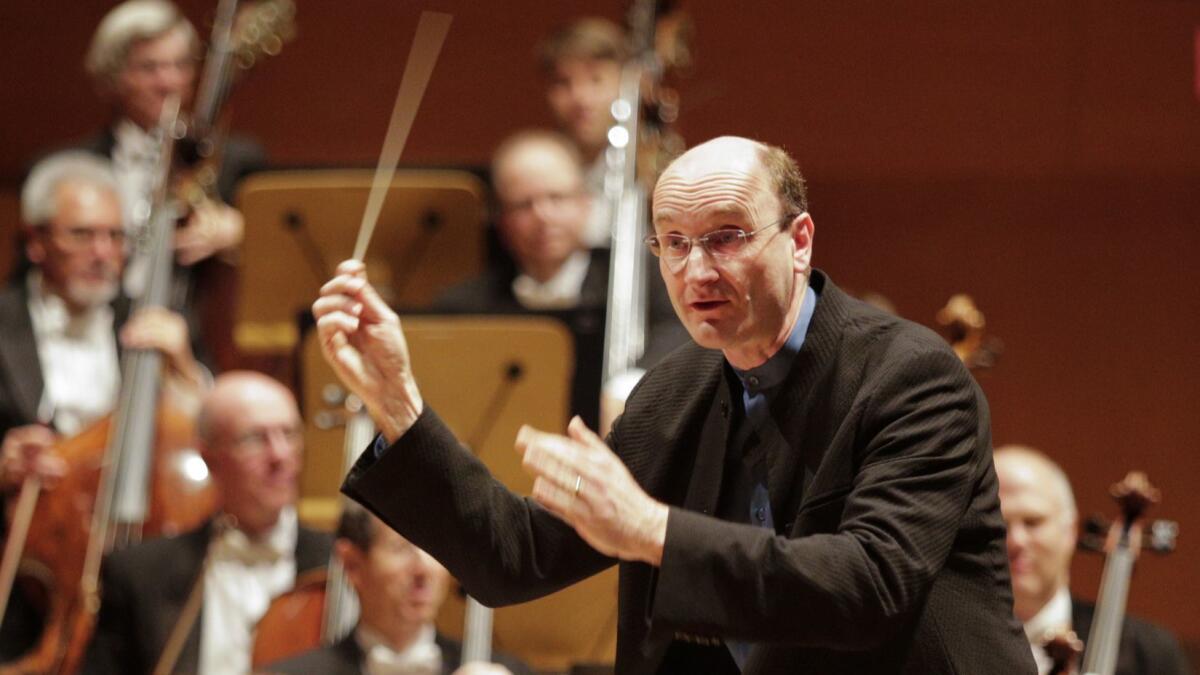Review: Andrew Manze leads the L.A. Phil through a night of firsts

- Share via
Revelation seemed to follow revelation at Walt Disney Concert Hall on Thursday night as guest conductor Andrew Manze led the Los Angeles Philharmonic in a stunning program of three seldom-performed works by Grazyna Bacewicz, Mozart and Ralph Vaughan Williams.
The concert’s centerpiece was Mozart’s gracious Piano Concerto No. 18 (K. 456), with Richard Goode as soloist. It was the first time the L.A. Phil performed the piece since 1990.
For the record:
4:40 p.m. March 30, 2018An earlier version of this article erroneously said the Los Angeles Philharmonic’s concert Thursday was its first performance of Mozart’s Piano Concerto No. 18 (K. 456). The concert was the orchestra’s first performance of the piece since 1990.
The Mozart concerto isn’t showy, to be sure. But Manze’s clear-textured rendition, featuring Goode’s crisp articulation and alluring tone, made a convincing case for the many delights of this intimately scaled score, with its poignant central Andante and charming Allegro finale.
After intermission, Manze gave a stunningly assured traversal of Vaughan Williams’ haunting, modern-sounding Symphony No. 6. (The English conductor is close to completing a cycle of the composer’s nine symphonies with the Royal Liverpool Philharmonic on the Onyx Classics label.) The Sixth, composed between 1944 and 1947, received its last L.A. Phil performance in 1981, with Leonard Slatkin on the podium.
“The Phil has had 37 years to recover,” Manze quipped, preparing the audience for the symphony’s uncharacteristically disquieting mood of spiritual desolation. “There’s a beautiful moment in what we might call the first movement’s second theme,” Manze said. “Cherish it, because it’s the only one.”
Known as the most prominent figure in the British pastoral school of composing, Vaughan Williams had already shocked some listeners who expected the atmospheric charms of his Third Symphony (“A Pastoral Symphony”). When he wrote the percussively intense Symphony No. 4 (1935), it was widely seen as a presentiment of the Second World War.
Although the composer said the Sixth had more to do with rage at the dying of the light — he was in his mid-70s when he completed the score — earlier autobiographical elements were clearly at play. Here was a man who had seen the worst of World War I serving in the ambulance corps at the French front, one who was only 2 years old when he lost his father. Manze’s reading conveyed the composer’s pervasive sense of loss with a gripping opening Allegro that, in that one “beautiful moment,” looked achingly backward to a world that existed briefly, if at all.
After the tautly rendered first movement, Manze let the Moderato, which he described as “Shostakovich tough,” unfold in brittle, menacing fashion, with superb playing from principal oboist Anne Marie Gabriele and the resonant L.A. Phil brasses.
Expertly performed by Patrick Posey, the touching tenor saxophone solo in the concise Scherzo was reportedly Vaughan Williams’ tribute to a friend, a jazz musician killed in the Blitz.
The real test of a great performance of the Vaughan Williams’ Sixth is whether the long Epilogue finale’s pianissimo playing can sustain meaning and tension over some 11 minutes. This one did. The audience remained in thrall, with not a single exit. Manze and the orchestra’s fine strings suspended time itself, with a heartbreaking solo by principal cellist Robert de Maine only adding to the emotional affect.
The concert began with an understandably under-rehearsed yet still driving account of Polish composer Bacewicz’s knockout 1943 Overture, a first performance for the L.A. Phil.
See all of our latest arts news and reviews at latimes.com/arts.
MORE MUSIC:
MTT takes Mahler to a new level in San Francisco Symphony tour
The voices of Angela Davis and Lech Walesa, via piano
At Pasadena Symphony, a musical puzzle played with high spirits
More to Read
The biggest entertainment stories
Get our big stories about Hollywood, film, television, music, arts, culture and more right in your inbox as soon as they publish.
You may occasionally receive promotional content from the Los Angeles Times.










